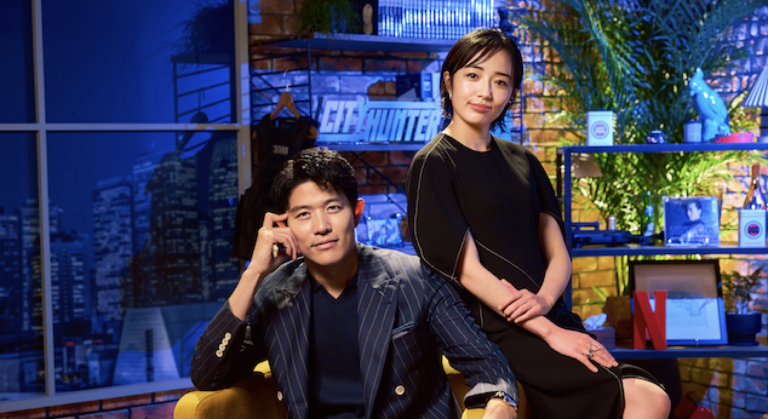
Ryohei Suzuki and Misato Morita, ©Courtesy of Netflix
City Hunter : An exceptional marksman and hopeless playboy, private eye Ryo Saeba reluctantly forms an alliance with his late partner’s sister to investigate his death.
Director : Yuichi Sato
Producer : Shinichi Takahashi
Screenwriter : Tatsuro Mishima
Distributor : Netflix
Production Co : Netflix Studios, Office Shirous, Horipro
Genre : Drama
Original Language : Japanese
Release Date (Streaming) : Apr 25, 2024
Runtime : 1h 42m
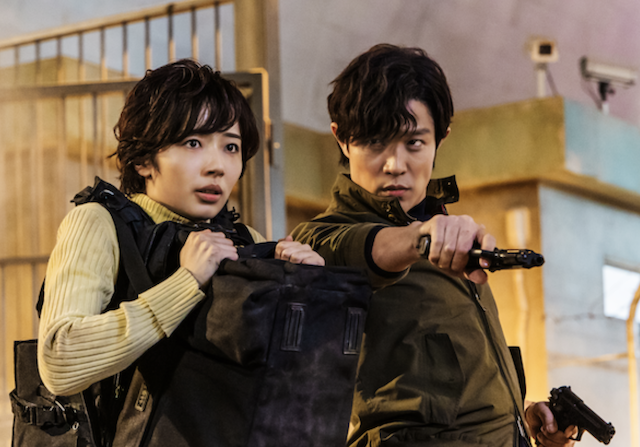
Misato Morita and Ryohei Suzuki, ©Courtesy of Netflix
Interview with Actors Ryohei Suzuki and Misato Morita
Q: What was the biggest challenge in making this film for each of you?
Ryohei Suzuki: Since I was a child, I was a huge fan of City Hunter. For me, it was trying to share what was great about City Hunter without losing the overall impression of what City Hunter was about. of course, we placed it into a more contemporary setting. we were covering Volume 1 of the original manga, so this is really an origin story of how they came to be. How we would do that in film was the biggest challenge.
As an actor, of course, it was a challenge, but I was also able to be part of the writing process as well. It was really about how to bring out a contemporary version of Ryo Saeba with all his characteristics but I often joined discussions on the script with the creators. It was about the whole film, how it was going to be so we can reach all the audiences. Another huge challenge of mine was for the fans to go, “Oh, yes, this is exactly City Hunter.” But, it was also for those who may not be initiated. There might be people in other countries who don’t know anything about City Hunter. So I want them to also go, “Oh, this is really fun.” I wanted to make sure that it worked both ways.
Misato Morita: What [Ryohei Suzuki] actually said covered everything already. This is a title taking place in the Reiwa era, which is more contemporary in Japan, as opposed to the Showa time, which is when the original manga series came out. I was grappling with finding the right balance between a contemporary version of Kaori, the manga version, and this raw person, the human being Kaori. She has to be this living, contemporary person, but also has to draw something from the manga as well. To find the balance was the hardest part of it.
Q: “City Hunter” has a timeless appeal. Even though the original anime came out more than 30 years ago, what do you think is the reason why it resonates so well with audiences?
Ryohei Suzuki: I think there are two reasons, but if I say two, Kaori-chan (Misato Morita) might say that I said everything [laughs]. I don’t know if I can say even one of them, so what should I do?
Misato Morita: I don’t know. I can’t answer, but should I speak first?
Suzuki: Please go ahead.
Misato Morita: When I was reading the manga, one of the things I absolutely loved was how the story was very grown up. It’s dark, it’s serious, but at times, represented by the word or expression, Mokkori, it can be really silly, and I love that gap. I think that’s one of the many reasons why the property, the IP, endures.
Ryohei Suzuki: You actually nailed one of the two I was going to answer. The gap for sure[is there], as Misato just said. But I always had a feeling that City Hunter actually existed when I was reading the manga or watching the anime in childhood. I love that feeling. It’s almost like you feel Superman actually resides in New York City. That hero actually is somewhere within this world that we live in. I really love that feeling. I think that maybe that’s one of the reasons why it is so popular and again, why it endures.
For example, in one season of the anime, there was an end credit that rolled in the background where they used not drawings or animation, but actual photographs from Shinjuku. I’d never seen an anime do that. It felt very grown up as well. It had this feeling of the manga and anime, that it’s taken from trying to bring the world of live action into the world of anime and manga. I’ve not really seen an IP like that. Maybe this is the only one that has that kind of tone.
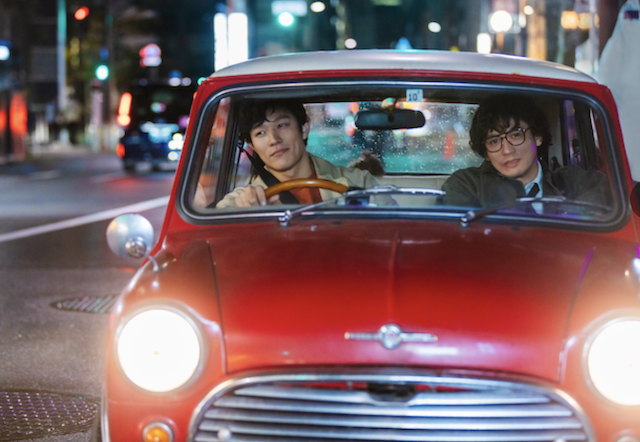
Ryohei Suzuki and Masanobu Ando, ©Courtesy of Netflix
Q: How does the dynamic between Ryo and Kaori, his partner and caretaker of the “City Hunter” business, evolve throughout the movie?
Ryohei Suzuki: Do you want to go first?
Misato Morita: Yes, otherwise you would say everything laughs].
Ryohei Suzuki: Please, go ahead.
Misato Morita: We are covering Volume One of the manga. Kaori is very much that sugar boy. Some people mistake her for a boy. She has this kind of boyish aspect to her yet, as she goes through the experiences in the film with Ryo, she hits walls, overcomes them and eventually becomes the version of Kaori that everybody knows from the anime and manga. At least that was my hope, as I was challenging myself on set. Also, for those who haven’t seen City Hunter in any way before, I hope that they get this feeling of this growing body between the two. It seems like inherently the wavelength that you have, already instinctually from the beginning.
Ryohei Suzuki: With Netflix’s City Hunter, the story, the narrative itself, is driven by the character of Kaori. That’s something different from the source materials. In this version, she’s more independent, stronger and has her own ability and will to accomplish what her ultimate purpose is. She became a very tough character. Even in the original, Kaori Makimura was a strong character who would liberally hit Ryo with this hammer.
But Kaori in 2024 version, though she does ask Ryo for help, if he’s not going to give it to her, she doesn’t care. She can go and avenge herself. She has this strong will and an ability that comes with it. Of course, Ryo, at the same time, is working on his own to solve what’s happening. They eventually find that their goal is the same. They come together in this journey and also overcome the grief of having lost somebody that they both loved. In this journey, they eventually become buddies. That’s the story.
Q: Ryo and Kaori have already been played [by others] a few times before. Did you watch your predecessors to avoid doing the same thing, or did you prefer to give your own style to this new interpretation?
Misato Morita: In my case, myself and who Kaori is or who everybody perceives as Kaori, is a very different person. I very much wanted to become close to the Kaori that everybody knows. Actually, I did listen to a lot of [Kazue] Ikura san’s, she’s the voice actor, and also wrote some of the dialogue in the manga, in an effort to get closer to the Kaori that everybody knows. In terms of the look, Ryohei gave me great advice about the posture, how to stand, and how to deliver certain lines. He helped me, and, together, we were able to find the elements that make the Kaori that everybody knows. My objective was to try to get as close as possible to the Kaori from both the manga and anime.
Ryohei Suzuki: I’m a huge fan of any and all versions of “City Hunter.” I have seen every version of “City Hunter” that exists in the world. Actually, one of my favorites is the French version, played by Philippe Lacheau, [who does it] with so much love, that, as Japanese “City Hunter” fans, we so much appreciate his work. It was really popular when it came out.
It was certainly an inspiration that we drew from, but of course we were making this a Japanese story, an origin story set in Shinjuku, the real Shinjuku. Also, I felt that Philippe was taking more inspiration from the anime whereas, for our live action version, we were taking more inspiration, or trying to, to get closer to the manga version. I was trying to think what the differences were. This was something that I was very cognizant of, even from the beginning of the journey.
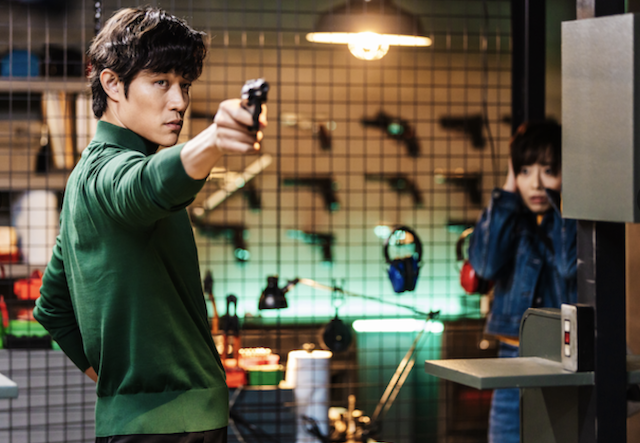
Ryohei Suzuki and Misato Morita, ©Courtesy of Netflix
Q: How do you compare and contrast your performance with the “City Hunter” animation voice actors Akira Kamiya and Kazue Ikura? Did they have any influence on you or did you try to create your own voice for this live action adaptation?
Misato Morita: I did make an effort to get close to Ikura san’s voice. But, as a raw sort of human being, my humanity wasn’t as close to what she had presented through that voice. So, although I tried, I don’t feel like I was able to simulate her voice. I actually practiced when Ikura-san raised her voice, I did that at home. I was screaming in my room.
Ryohei Suzuki: It was complex in my case because I feel, especially in Japan, when it comes to City Hunter a lot of people are attached to the anime, and especially Akira Kamiya’s voice as Ryo Saeba. And if it comes to a live action version, if they hear somebody else’s voice, other than Kamiya san’s, people will, like an allergy, say, I’m not going to watch this. This is not “City Hunter.” At least I’m one of those fans. I feel like maybe there are some other Japanese anime fans that feel the same way.
It is a huge IP [intellectual property] — “City Hunter.” I already knew this but as an actor, I did not want to mimic Kamiya san’s voice in any way. I wanted to find an original voice to play this character. But at the same time, I had been a huge fan of “City Hunter” for three decades. So I’ve always been listening, hearing Ryo Saeba’s voice as Kamiya san’s voice, so even when I was reading the screenplay, it was the same.
Once we started principal photography on day two, day three, although I tried, I knew that it was impossible not to kind of be pulled towards Kamiya san’s way of speaking. So I said that I can’t do anything about that. I eventually landed in a place where people will recognize, “Oh, this is Ryohei Suzuki’s voice, but it also feels a little like Kamiya san’s voice as well.” That’s consequently where I landed. It’s a bit like, speaking hypothetically, if I were able to play Batman in the future, I probably would speak in this tone [coarse Imitation of Batman] of Batman’s voice from “Dark Knight.” In a way, we are bound by these influences, aren’t we?
Q: What was it like with the action training? Could you share your favorite action sequence from the movie?
Misato Morita: Well, I only have one action scene and…
Ryohei Suzuki: No, you have the other one, the last scene as well, and the cosplay event.
Misato Morita: I did the one scene I practiced for, which was with the gunplay at the end. I was talking to [Takashi] Tanimoto san, the action director, and we both agreed that we didn’t want Kaori to have a set way of fighting, because she’s not a fighter. She’s more driven by emotion. Her movements should be that way rather than being somebody well-trained in combat. She’s more flustered in those moments rather than in executing a fight. She’s embroiled in these action moments.
I felt very much in the moment to concentrate not on the movements, or any of the things that I had to do in terms of action like the choreography, but on her feeling, her emotions, and that passion to make this happen. How Kaori would fight with her emotions linked up. Personally, I’m very happy with how I was able to execute that gunplay sequence. Of course, when it came to the hammer scene, that was something that I was very much looking forward to doing. I got to hit Ryo with it, so that was a moment of great happiness for sure.
Ryohei Suzuki: All the action moments were very challenging for me. I worked hard on training for all of it. It’s really difficult to choose but if I were to talk about a less flamboyant moment, there’s a moment at the beginning of the opening sequence when I’m handling a CP 226, which is an enemy gun that I take from them and disassemble in front of them without looking at the gun. This was something that required a lot of practice on my part. I’d been closing my eyes as I would disassemble the model gun over and over for like three weeks and then came shooting day. I was able to get it done in one take and the recoil jumped out of the gun in a perfect way. It was really tough but it’s one of my favorite moments.
There’s another action moment that I’d like to talk about, which, again, is a very modest moment as well. It’s when Kaori joins Ryo at the undergraduate shooting range and he’s holding a Colt Roman which has five bullets in it; he shoots them five times in a row. The kickback is very realistic but when you use a prop gun, there’s no recoil. It’s the actors who are doing the recoil, how it kickbacks on to the body. I feel like I was able to execute it in a very realistic way.
Misato Morita: It’s kind of funny when you watch that scene, to know that you’re doing the recoil.
Ryohei Suzuki: For the “guns” moment scene, I actually did go abroad to train for about four to five days, especially when it came to the recoil. The kickback was one thing that I really had to give a lot of thought to — how to make it look authentic. I was really happy with how it came out. I want to add one more scene, if I may. This is a moment of reloading the gun. I don’t think I’ve seen it done in any other work. With the action director, we assembled these clips of revolvers being reloaded, went through all of them. But, as I [Ryohei] demonstrated, I opened the cylinder on the right and then maybe brought the gun to the left to reload. Then again, shooting on the right is something that’s never been seen before. I’m really happy with that scene, too.
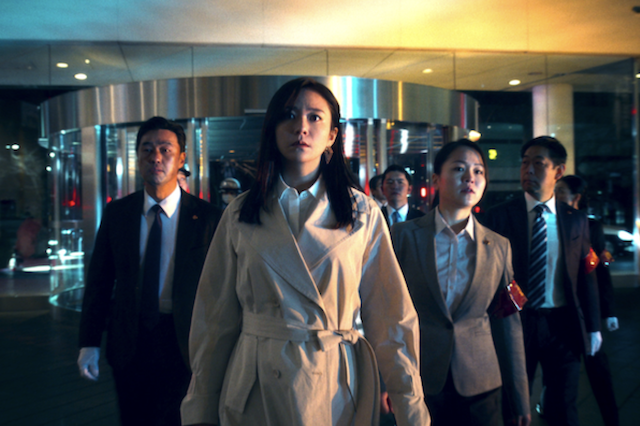
Fumino Kimura, ©Courtesy of Netflix
If you liked the article, share your thoughts below!
Check out more of Nobuhiro’s articles.
Here’s the trailer of the film.

